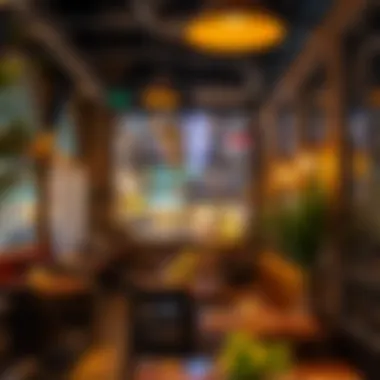Restaurant Opportunities in Dubai's Karama Neighborhood


Intro
Dubai's Karama neighborhood stands as a bustling hub that intricately combines tradition with modernity. Known for its vibrant community, this locality offers more than just a cultural experience. The restaurant scene here is burgeoning, making it a prime candidate for prospective buyers looking to dive into the food business. This article strives to equip investors, homebuyers, and real estate professionals with critical insights to navigate the restaurant market efficiently. From understanding market dynamics to identifying potential investment avenues, this guide endeavors to provide a comprehensive overview of the restaurant opportunities in Karama, ensuring that readers make informed decisions.
Market Insights
Latest Trends in Dubai Real Estate
As the real estate landscape in Dubai evolves, Karama stands out with its unique set of characteristics. Recent reports indicate that the demand for commercial spaces in this area has seen a steady uptick. Factors like the influx of expatriates and an increasingly diverse population create a fertile ground for restaurant growth. Both casual eateries and upscale dining establishments are viewing Karama as a promising locale, offering various cuisines that cater to its multicultural residents. Alongside this, rental prices have remained relatively stable compared to other areas, providing potential for high return on investment.
Impact of Global Events on Local Market
World events often ripple through local economies, influencing consumer behavior and market trends. In the aftermath of the pandemic, the restaurant sector experienced both challenges and opportunities. Health consciousness amongst consumers has surged, prompting restaurants to adapt menus and services accordingly. While dining footfall fluctuated in the early days of reopening, recent statistics show a resurgence in dining out, with many turning to local establishments for culinary experiences. This has prompted a re-evaluation of business strategies within the Karama restaurant landscape.
"In today’s market, flexibility and adaptability are paramount for success in the restaurant industry."
Investment Opportunities
High-Return Areas for Property Investment
There are certain pockets within Karama that exhibit remarkable growth potential for restaurant ventures. Areas close to popular shopping destinations or community centers tend to attract more foot traffic. Specifically, zones near Karama Center or the busy streets lined with shops and residential complexes are ideal for those looking to invest. Likewise, proximity to public transport options can also elevate a restaurant's visibility and customer base.
Tips for First-Time Investors
- Research the Market: Understand current trends and consumer preferences in the Karama restaurant scene.
- Choose the Right Location: Look for sites with high visibility and accessibility.
- Engage with Local Community: Connecting with residents and understanding their needs can help tailor your offerings.
- Financial Planning: Assess your budget carefully, considering all costs—renovations, supplies, staffing, and marketing.
- Comply with Regulations: Ensure you are up to date with health and safety laws to avoid any future legal pitfalls.
By adhering to these practices, investors can position themselves to not only enter the market but to thrive within it, making the most of the vibrant culinary scene that Dubai's Karama neighborhood has to offer.
For more detailed insights, consider visiting resources like Wikipedia or Britannica for background on Dubai's cultural and economic atmosphere.
Foreword to the Restaurant Market in Karama
Karama, a lively district in Dubai, is not just a melting pot of cultures but also a hotspot for culinary innovation. The restaurant market here plays a crucial role in the local economy, offering a vibrant mix of dining options that cater to both residents and visitors. As one delves into the opportunities within this neighborhood, one must appreciate the unique attributes that contribute to its appeal.
Understanding the restaurant market in Karama starts with recognizing the diverse demographic it serves. The mix of nationalities creates a rich tapestry of culinary preferences, drawing both expatriates and locals alike. For investors, this diversity translates into countless possibilities when it comes to menu offerings, ranging from traditional Emirati dishes to international cuisines. This makes Karama a worthwhile consideration for anyone looking to invest in a restaurant venture.
Moreover, the implications of location cannot be overstated. Situated close to several residential areas and shopping districts, restaurants in Karama benefit from substantial foot traffic. The area is also easily accessible by public transport, making it convenient for patrons to frequent dining establishments. To maximize their investment, potential buyers should evaluate how location and accessibility influence the viability of a restaurant.
Another key point to explore is the competitive landscape. While opportunities abound, it is essential to grasp the competitive dynamics at play. Investors need to analyze existing establishments and identify niches that remain unfilled. By capitalizing on these gaps, a new restaurant can carve out its unique space in the market.
To start strong, investment in market research is vital. Understanding consumer trends, dietary preferences, and spending habits can provide insights that can make or break a restaurant's success.
In summary, the restaurant market in Karama is ripe with opportunities, but success hinges on thoughtful consideration of demographic diversity, location, competition, and consumer behaviors. For prospective buyers, having a clear strategy and an eye on market trends will enhance their chances of establishing a prosperous dining venture in this bustling area.
Overview of Dubai's Culinary Scene
Understanding the culinary scene in Dubai offers key insights for potential investors and restaurateurs. Dubai is not just a hotspot for tourists; it’s a melting pot of cultures, and its food landscape reflects this diversity. From street stalls to luxury dining, the choices are as wide as the city itself, presenting a wealth of opportunities for aspiring restaurant owners.
The significance of the culinary scene lies not only in the variety it offers but also in its role as an economic driver. Food and beverage establishments contribute significantly to Dubai's GDP, and with tourism continuing to grow year over year, the potential for culinary ventures remains robust. Investors should pay attention to emerging trends and changes in consumer preferences, which can dramatically affect restaurant performance.
Historical Context
Dubai’s food scene has a rich history, evolving from the simple fare of local fishermen and pearl divers to the opulent dining options that exist today. In the earlier decades of its development, dining was largely centered around traditional Middle Eastern cuisine. Cafés and small family-run restaurants served dishes that were seasoned with the region's authentic flavors, reflecting the nomadic lifestyle and the bustling trading culture of the past.
Fast forward to the late 20th century, Dubai saw a rapid transformation fueled by globalization. The influx of expatriates brought a plethora of international cuisines to the shores of the Arabian Gulf. With iconic establishments like Al Fanar Restaurant and Café, which pays homage to Emirati heritage, to five-star venues like Nobu, Dubai has sculpted a food culture that signifies opulence, innovation, and creativity.
Current Trends
As of 2023, the culinary landscape in Dubai is dynamic and ever-evolving. Here are some trends that stand out:
- Sustainability in Dining: More restaurants are focusing on eco-friendly practices, from sourcing local ingredients to minimizing food waste.
- Health-Conscious Choices: With an increasing number of people prioritizing health, there's a rise in eateries offering organic and health-focused menus. Plant-based options are becoming more prevalent, attracting a new customer base.
- Experiential Dining: Many establishments are shifting towards providing more than just a meal. Themed dining experiences or restaurants with unique concepts draw in crowds looking for memorable nights out.
"The culinary scene in Dubai is as much about the experience as it is about the food. A dish might hit the palate, but it's the entire atmosphere that leaves a lasting impression."
In this rapid-paced city, consumer tastes continue to shift, influenced by travel, social media, and cultural exchanges. Investors who stay ahead of these trends will find themselves well-positioned to succeed in the vibrant and competitive restaurant market of Dubai, particularly in Karama, where the community's preferences and cultural influences play a significant role.
The Karama District: A Culinary Hub
Karama has truly carved out a niche for itself in the bustling culinary landscape of Dubai. This area, rich with diversity and a dash of cultural vibrancy, presents a unique environment for restaurants. Every corner of this neighborhood tells a story, and its eateries are no exception. They reflect the melting pot of cultures that constitute its population. From affordable eateries serving local delights to upscale dining experiences, the options are as varied as the residents.
Investing in a restaurant here is more than just a business venture; it's an opportunity to tap into a community that thrives on culinary experiences. The neighborhood's accessibility and its close-knit atmosphere foster not just customer loyalty but also a steady flow of foot traffic, appealing to investors and restaurateurs alike.
Demographics and Population Insights
When considering the restaurant market in Karama, it’s imperative to understand who resides here. This district is home to a wide array of residents, the majority being expatriates from various nations. The multicultural community has resulted in a high demand for diverse food options that cater to different tastes.
- Population Diversity: The demographics encompass individuals from South Asia, the Middle East, and other regions of the world. Therefore, restaurants offering Indian, Pakistani, Middle Eastern, and Asian cuisines generally see significant patronage.
- Economic Activity: Most residents are working professionals or families, leading to regular dining habits, particularly in the evenings and weekends.
- Age Distribution: A youthful population is prominent in Karama, where appetites for trendy food concepts and social dining experiences are high.
The insights gathered from understanding demographics provide a foundational understanding for anyone looking to invest in or open a restaurant in this district.
Cultural Influences on Restaurant Choices
Culture plays a pivotal role in shaping the dining preferences in Karama. Each resident brings their culinary traditions, expectations, and preferences to the table. Here are some key influences:
- Festivals and Celebrations: Various cultural festivities often lead to increased demand for specific cuisines. For instance, during Ramadan, there’s a noticeable rise in the need for Iftar setups and traditional foods.
- Family-Oriented Dining: Many restaurants capitalize on the family aspect, designing spaces that accommodate groups, which is reflective of cultural norms that promote communal dining.
- Social Media Influence: Younger demographics often look up food trends on platforms like Instagram. Restaurants that leverage visual appeal and aesthetic dining experiences can attract a lot of attention through social sharing.


By recognizing these cultural influences, potential restaurant owners can better tailor their offerings to suit the tastes and preferences of the community, enhancing the chance of achieving sustained success.
Reasons to Invest in Restaurants in Karama
Investing in restaurants within Karama brings with it a bouquet of opportunities that can bloom into significant financial rewards. With its unique demographic mix and steady influx of visitors and residents, the region presents a fertile ground for aspiring restaurateurs. Understanding why this vibrant district is worth your time and resources can unravel possibilities you might not have considered.
Financial Incentives and ROI
One of the first things that strike a chord with potential investors is the prospect of financial incentives. The government has been keen to foster economic growth, establishing a supportive environment for small businesses and reducing bureaucratic hurdles. Such incentives might include lower licensing fees or tax breaks for new establishments—really a shot in the arm for those looking to get their foot in the door without draining their wallets.
In terms of return on investment (ROI), Karama holds its own. Restaurants located here tend to attract both locals and the ever-growing expatriate population. When you launch a new dining concept that resonates well, particularly with a community that relishes diverse culinary experiences, the profits can start rolling in quicker than you might expect.
For instance, let’s consider a cafe that caters to the neighborhood’s youth with a mix of international flavors and locally-inspired delicacies. Such a business can see a decent turnover, especially if it capitalizes on social media marketing to attract the younger crowd. As word-of-mouth spreads, so can your customer base, leading to a favorable ROI over time.
Growth in Tourism and Local Residents
The surge in tourism plays an undeniable role in making Karama a hotbed for dining experiences. With the influx of visitors curious to savor the culinary tapestry of Dubai, restaurants here can benefit immensely from footfall. The wide array of tourists, from food bloggers looking to discover authentic eats to families seeking a delightful meal, contributes to a robust market environment.
At the same time, local residents also add to the culinary scene. The diverse population in Karama is constantly on the lookout for new dining experiences—whether that’s a cozy spot for a family dinner or an exciting place for a night out. This dual demand makes it essential for restaurant owners to understand their customer base deeply. Adjusting menus to accommodate both international tastes and local preferences can spell success.
"By tapping into both the resident and tourist markets, restaurant owners have a unique advantage that can propel their business to great heights."
As Karama continues to evolve as a culinary destination, any investor can take comfort in knowing that the area’s hospitality landscape is not just a trend but a steady trajectory toward growth. Fostering relationships within the community and creating memorable dining experiences will keep your doors swinging open long after your first meal is served.
Types of Restaurants Available for Sale
When considering restaurant opportunities, understanding the types of establishments available for sale is crucial. Each category has its unique appeal and operational requirements. Entrepreneurs must tailor their approach to match their strengths and the preferences of the local market. Within Dubai's vibrant Karama area, the culinary landscape is diverse, allowing investors to find a niche that suits their goals.
Exploring these categories aids potential buyers in identifying favorable investment prospects, evaluating costs, and anticipating consumer demand. Furthermore, a deep dive into available restaurant types provides insights into competition and market trends, revealing opportunities for success.
Casual Dining Establishments
Casual dining spots are a staple in Dubai Karama, offering a relaxed atmosphere with diverse menu options. Wether they serve Italian pasta dishes, Indian curries, or innovative fusion cuisine, these establishments appeal to families and groups looking for an affordable yet enjoyable dining experience. The ambiance typically strikes a balance between comfort and formality, presenting ample space for social interactions.
Prospective buyers should consider factors such as:
- Location: Visibility and accessibility heavily influence a casual dining restaurant’s success. High foot traffic areas tend to offer better patronage.
- Menu Diversity: Highlighting a range of options can cater to a broader audience, enhancing customer retention.
However, owning a casual dining restaurant also presents challenges, such as managing fluctuating ingredient costs and labor-intensive service. With the right strategy in place, these establishments can become beloved community spots, contributing to growing profits and strong customer loyalty.
Fast-Casual and Quick Service
Fast-casual and quick service restaurants thrive on efficiency and accessibility, characteristics that resonate with busy urbanites. In the Karama district, where time is often of the essence, these restaurants offer quick yet satisfying meals without compromising on quality. Selling everything from gourmet burgers to fresh salads, they cater to diverse dietary preferences.
Key considerations include:
- Operational Efficiency: Streamlined operations can maximize speed and minimize wait times, which are critical in retaining clientele.
- Digital Presence: As more consumers turn to online ordering, a strong digital strategy incorporating delivery options is essential.
Investing in a fast-casual restaurant can offer significant returns in an era where convenience is king. However, prospective investors need to keep an eagle eye on competitors who continuously evolve to capture market share.
Specialty Cuisine Options
Specialty cuisine restaurants, which provide unique culinary experiences, have gained traction in Dubai's Karama area. This category encompasses a wide range of offerings, from vegan delicacies to authentic Middle Eastern fare. When a restaurant emphasizes a specific culinary tradition or dietary focus, it cultivates a distinct brand identity that can resonate powerfully with consumers.
Essential factors to evaluate include:
- Culinary Authenticity: Establishments that prioritize authenticity often foster loyal customer bases. It’s vital that chefs skillfully represent their culinary heritage.
- Marketing Strategies: Effectively promoting the restaurant’s specialization can elevate its visibility in a crowded marketplace.
Those interested in investing in specialty cuisine restaurants should also keep in mind the significance of storytelling. Sharing the heritage behind dishes can capture the imagination of potential patrons.
According to industry experts, Consumers are increasingly searching for unique dining experiences that allow them to explore different cultures through food.
In summary, understanding the different types of restaurants available for sale in Dubai's Karama area is vital for any investor. By analyzing the characteristics, challenges, and opportunities inherent in each category, potential buyers can make informed decisions. Selecting the right type of restaurant not only aligns with individual goals but also ensures that the establishment resonates with the vibrant community in Karama.
Key Factors Affecting Restaurant Viability
The restaurant business thrives on various elements that can make or break an establishment, particularly in a bustling locale like Karama. Recognizing these factors not only equips investors with essential knowledge but also influences decision-making processes. In a landscape where competition is fierce and consumer tastes evolve continuously, understanding the nuances of viability is paramount for anyone looking to invest in this market.
Location and Accessibility
The adage "location, location, location" isn't just a catchy phrase; it's the cornerstone of success in the restaurant industry. In Karama, the proximity to public transport and high foot traffic areas significantly impacts a restaurant's performance. If you’re nestled near a metro station or within walking distance from multilayered shopping complexes, your visibility escalates dramatically.
Furthermore, accessibility is a two-way street. It not only pertains to ease of getting to your venue but also includes parking availability and surrounding infrastructure. When customers find a place that's a breeze to get to, they’re more likely to swing by for a meal, rather than opting for a restaurant that’s difficult to access.
- Key points to consider:
- Visibility: Is your restaurant easily seen from the main road?
- Transport Links: Are there reliable public transport options nearby?
- Parking: Is there ample and convenient parking for diners?
Market Saturation and Competition
When entering the restaurant scene in Karama, one cannot avoid the reality of competition. The fact is: too many restaurants can sometimes spoil the broth. While an abundance of eateries can suggest a thriving market, it can also indicate that it’s crowded—like a can of sardines. Conducting thorough research is essential. Understand who your competitors are and what they are offering.
A crowded market doesn't mean opportunities are scarce; it just necessitates a keener strategy. Unique selling propositions (USPs) become your best friends. Whether it's a distinctive menu item, exceptional service, or a unique ambiance, carving out a niche can set your restaurant apart from the pack.
- Competition factors to analyze:


- Competitive Landscape: Identify direct competitors within your vicinity.
- Price Points: How will your pricing compare?
- Customer Preferences: What do patrons love or loathe about existing options?
Existing Customer Base and Foot Traffic
Foot traffic is more than just a buzzword in the restaurant trade; it’s a vital ingredient for success. Restaurants situated in areas with high foot traffic naturally have a better chance of attracting patrons simply because people pass by frequently. However, understanding the demographics of that foot traffic is equally critical.
Knowing your potential customers lays the foundation for menu design, marketing approaches, and even operational hours. For instance, if your restaurant is frequented by families during weekends, consider launching family-oriented promotions or themed nights that cater to their preferences.
- Customer behavior insights:
- Time of Day: What hours see the highest traffic?
- Demographics: Are you attracting young singles, families, or professionals?
- Spending Patterns: What are typical expenditure levels of foot traffic?
Understanding these key factors can illuminate paths towards making better decisions in the vibrant restaurant landscape of Karama.
Navigating the Buying Process
When considering the acquisition of a restaurant in Karama, navigating the buying process is critical. This stage isn’t merely a formality; it shapes the potential success of a restaurant investment. Understanding the foundational steps will empower buyers with necessary knowledge, ensuring they make informed decisions. The complexities of restaurant acquisitions span financial evaluations, legal frameworks, and operational planning. Thus, buyers should approach this phase with a keen eye and a methodical mindset.
Research and Due Diligence
Diving into the research and due diligence aspect isn’t just about flipping through pamphlets or scrolling through listings. It’s a thorough investigation into the health and viability of a potential restaurant purchase. Buyers ought to analyze market demands, assess competition, and evaluate customer preferences.
Observing the foot traffic and demographics in Karama can greatly inform the decision-making process. For instance, some neighborhoods might favor quick-service eateries, while others gravitate towards fine dining.
It’s equally crucial to evaluate the financial records of the business being considered. Profit margins, expenses, and growth patterns are significant indicators of a restaurant's performance. A detailed examination of the last few years' tax returns or profit-and-loss statements may offer insights that help predict future earnings.
- Identify key performance indicators (KPIs):
- Sales trends
- Average customer spending
- Seasonal fluctuations
If there are existing franchise agreements or operational restrictions, these should also be taken into account, as they may affect future profitability. The more information gathered during this phase, the less likely buyers will face unexpected surprises down the road.
Legal Considerations and Documentation
The legal landscape of buying a restaurant can be as complex as preparing a fine-dining dish. Contracts, permits, and local regulations play pivotal roles in the process. Understanding and complying with these necessities cannot be overstated. Failure to do so could put a buyer in hot water, potentially risking their investment.
Key legal considerations include:
- Licensing requirements:
- Food and beverage licenses
- Health inspections
- Employment laws
Additionally, comprehensive understanding of contractual obligations is crucial. Review all documents with a legal expert to ensure that terms are favorable and that there are no hidden clauses that could lead to disputes.
Documentation plays a vital part in the process. Buyers should ensure that all paperwork is well organized. This includes:
- Sales agreements
- Leases
- Employee contracts
"Proper documentation isn't just a good practice; it's a shield against potential future issues that could derail an investment."
Engaging Real Estate Professionals
No one sets out on a journey without a map, or at least they shouldn’t. Engaging real estate professionals who specialize in commercial properties is a wise move for buyers seeking restaurants in Karama. These experts possess insights into local market nuances, zoning laws, and potential hidden opportunities that may not come across on surface-level research.
When entering negotiations, having an experienced broker can strengthen a buyer's position. They can help navigate complex discussions, ensuring that terms are favorable and fair.
Moreover, working alongside professionals such as financial advisors and lawyers can provide a multidisciplinary approach to the purchase. This collaboration helps in scrutinizing offers and enhancing confidence during discussions.
Ultimately, understanding the restaurant buying process involves diligence, legal awareness, and expert assistance. A methodical approach backed by thorough research can translate aspirations into reality within the burgeoining culinary landscape of Karama.
Financing Options for Restaurant Purchases
When considering the vibrant restaurant market in Karama, a solid understanding of financing options is critical. Whether you are a seasoned investor or someone dipping your toes into the culinary sea, realizing the various pathways to fund your dream restaurant can shape your success. In this segment, we will explore options that range from traditional methods to more contemporary approaches, helping you weigh the benefits and considerations associated with each.
Traditional Bank Loans
Traditional bank loans remain a stalwart among financing methods for restaurant purchases. They often provide larger sums of money at competitive interest rates, making it easier for buyers to secure the necessary capital. However, getting approved isn’t a walk in the park.
Key Benefits:
- Lower Interest Rates: Generally, banks offer lower rates compared to private lenders, which can alleviate some financial pressure over time.
- Longer Repayment Terms: With suitable terms, borrowers can extend their repayment period, which leads to more manageable monthly payments.
However, a more painstaking aspect lies in the stringent eligibility criteria banks apply. Prospective buyers must often present:
- A solid business plan;
- Proof of income and existing financial records;
- Collateral, typically from personal assets.
Ultimately, traditional bank loans can either propel you into the culinary world or lead you to a crossroads littered with missed opportunities.
Alternative Funding Sources
For those who feel daunted by the stringent demands of a bank, alternative funding sources offer more flexibility and innovative options. You might consider:
- Crowdfunding: Platforms such as Kickstarter or GoFundMe not only help raise funds but can create a community around your restaurant idea.
- Angel Investors: These individuals are often willing to invest in appealing ventures, allowing you to gain capital in exchange for future equity or revenue shares.
- Peer-to-Peer Lending: With services like Fundrise or LendingClub, you can borrow directly from individuals rather than banks. This can expedite the process without the red tape.
- Equipment Financing: If your main concern relates to outfitting your kitchen, consider equipment leasing or financing options from specialized lenders. This allows you to acquire necessary assets without a hefty upfront cost.
Utilizing these alternative funding sources can broaden your financial framework, instilling readily accessible methods that align with your business ambitions. Ultimately, understanding the various financing avenues can help you build a solid fiscal foundation and enhance your investment's viability in Karama's dynamic restaurant landscape.


"Knowledge of your financing options not only empowers your purchasing decision but also aligns your goals with market realities."
Whether you gravitate toward traditional loans or alternative means, the right choice will hinge on your individual circumstances and business aspirations. Dive deep into these options and make an informed decision that sets your restaurant journey on a steady course.
Post-Purchase Considerations
Investing in a restaurant in Dubai's Karama district is just the beginning of a journey laden with opportunities, but also challenges. After purchasing a restaurant, understanding the nuances of post-purchase considerations is crucial. This stage is often overlooked, yet it's where the real work begins. From management strategies to marketing approaches, this segment ensures your investment flourishes rather than flounders.
Management and Operations Planning
Effective management and operations planning are paramount following your restaurant purchase. A solid plan not only streamlines daily operations but also enhances customer satisfaction and boosts profitability. First up, it's essential to leverage the existing structure and culture of the institution. A restaurant with established clientele likely has routines that patrons value, such as certain menu items or service styles.
- Assess Staffing Needs: Evaluate whether you need to retain existing staff or bring in new talent. Familiarity with clientele can make a difference, but infusing fresh perspectives often brings innovation.
- Standard Operating Procedures (SOPs): Draft clear SOPs that lay out expected practices from kitchen protocols to customer service. This can prevent misunderstandings and ensure consistency across shifts.
- Inventory Management: Keep a close eye on stock levels and supplier relations. Establishing good relationships with suppliers can provide negotiating power and lead to better prices and reliability.
Marketing Strategies for Success
In a bustling area like Karama, standing out is imperative. Crafting effective marketing strategies is essential to not just attract new customers but also retain them. Here are critical components to consider when devising your marketing plan:
- Local Outreach: Engage the local community through events or promotions. Perhaps consider collaborating with nearby businesses for cross-promotions that can enhance visibility.
- Digital Presence: In a tech-driven world, an active online presence cannot be stressed enough. Social media platforms like Facebook and Instagram are not just for browsing; they can significantly influence dining decisions. Regular updates and enticing visuals of your menu can entice diners. Incorporate digital marketing tools, such as targeted ads, that allow you to reach specific demographics in the Karama area.
- Loyalty Programs: Establishing a loyalty program can work wonders. Whether it's offering discounts after a certain number of visits or free items after a set expenditure, incentivizing repeat business can improve customer retention substantially.
With careful planning during the management phase and strategic marketing foresight, new restaurant owners in Karama can pave the way for sustained growth and success. Keeping these post-purchase considerations in mind will certainly tip the scales in your favor as the culinary landscape continues to evolve in this vibrant area.
Case Studies of Successful Restaurants in Karama
In the bustling heart of Karama, restaurants thrive and evolve, showcasing a spectrum of culinary experiences. Analyzing these successful establishments provides invaluable insights into what makes a restaurant tick in this vibrant community. Understanding the dynamics of these successful ventures helps aspiring restaurateurs recognize essential components for their own success.
Analyzing Top Performers
Karama's restaurant scene is marked by a variety of top-performing eateries that encapsulate the essence of the area. These establishments boast unique concepts yet share common threads such as effective management, strong customer engagement, and adapting to local preferences.
Take, for instance, Biryani Pot, which has gained a loyal following for its authentic Indian cuisine. Their secret? Consistent quality and an attentive approach to customer feedback. The owners have cultivated a rapport with locals, often incorporating community suggestions into their menu. This adaptive strategy has not only solidified their reputation but has also led to increased foot traffic.
Another noteworthy mention is Koshari Point. This Egyptian eatery cleverly balances traditional flavors with modern dining practices. Their success stems from a clear understanding of their target audience, primarily expatriates and locals craving home-cooked flavors. They utilize social media effectively to engage and invite feedback, ensuring that they remain attuned to customer preferences.
Both examples underline the importance of community involvement and menu flexibility in achieving success. It is not merely about selling food but creating an experience that resonates with customers, keeping them coming back for more.
Lessons Learned from Failures
Despite the culinary delights in Karama, not every restaurant venture achieves its desired success. The tales of those that did not stand the test of time offer critical lessons for future investors.
One striking case is The Spice Route, which struggled in its initial months. Despite a promising concept focusing on pan-Asian cuisine, it failed to comprehend the competitive landscape. Their marketing strategies did not align with the expectations of the locality, resulting in poor visibility. Additionally, inconsistent food quality became a tip of the iceberg leading to its closure. This scenario exemplifies the importance of thorough market research and developing a solid marketing strategy.
Another cautionary tale revolves around a high-end sushi restaurant named Sushi Dreams. Though they started strong, their downfall stemmed from neglecting customer input. They failed to offer dishes that resonated with the primarily middle-income demographic of Karama. The inability to adapt to customer feedback resulted in dwindling interest and ultimately cease of operations.
Restaurants must stay rooted in their community and adapt their offerings based on customer needs and preferences. The realities of the food industry are relentless, and those unwilling to pivot may find themselves in dire straits.
By studying both the successful establishments and the cautionary tales, prospective restaurant owners can glean vital insights into the intricacies of running a restaurant in Karama. Understanding thenuances of customer preferences and market demands is crucial for any venture aiming to succeed in this vibrant dining landscape.
In summary, analyzing both winners and losers in Karama’s restaurant sector can guide future investments. It highlights that not just culinary skills but also community engagement, responsiveness to feedback, and adaptive marketing play pivotal roles in ensuring a restaurant’s longevity.
Future Outlook for Restaurant Investments in Karama
The future of restaurant investments in Karama holds promising potential. With a stable increase in the local population and a steady influx of expatriates, the demand for diverse dining options continues to grow. The vibrancy of the community is matched by its culinary diversity, allowing investors to tap into a market that is not only resilient but also increasingly sophisticated in its tastes and preferences.
Why This Matters
Investing in the restaurant sector in Karama isn't just about capitalizing on trends; it's about understanding the pulse of a community that cherishes its culinary heritage while being open to innovation. New restaurants often emerge from a blend of traditional recipes and modern dining concepts. Thus, the future outlook indicates a need for investors to keep their ears to the ground, listening for the next big wave in food trends.
- A growing interest in fusion cuisine signifies a desire for unique dining experiences among locals and tourists alike.
- Sustainable practices and organic ingredients are gaining traction, reflecting a broader trend in dining habits worldwide.
Key Considerations
As you consider diving into investments, keep in mind some important factors that can shape the direction of your venture:
- Regulatory Environment: Familiarizing yourself with local laws regarding restaurant operations, including licensing and health regulations, is crucial.
- Consumer Preferences: As tastes evolve, staying ahead of the curve will be essential. Investors should utilize market research to anticipate shifts in dining habits.
- Location Dynamics: While Karama is already a bustling area, understanding sub-neighborhoods and their unique demographics can enhance investment outcomes.
- Partnerships with Local Designers and Chefs: Collaborating with local talent not only enriches your restaurant’s concept but also builds community support, vital for long-term success.
"To succeed in Karama’s culinary market, one must blend tradition with innovation—this balance is the recipe for success."
In essence, the horizon looks bright for restaurant investments in Karama, provided that investors take calculated risks while embracing the qualities that make this community unique. By focusing on emerging trends and staying aligned with local preferences, your venture can thrive amidst the dynamic landscape that Karama offers.
Closure
In wrapping up our exploration of the restaurant landscape in Dubai's Karama district, it becomes obvious that entering this vibrant market is not just an opportunity, but a strategic move. The unique blend of local culture, diverse demographics, and burgeoning tourist interest presents a rich tapestry for culinary ventures. It's crucial to comprehend the local palate as well as the preferences that drive customer choices in this neighborhood.
Key Considerations
The success of a restaurant investment hinges on several important factors:
- Cultural Sensitivity: Understanding and respecting the multicultural backdrop of Karama is key. The area boasts a myriad of tastes influenced by various ethnic communities who bring their culinary traditions to the table.
- Market Research: Conducting thorough research is not merely a step but a necessity. Knowing the competition and who your potential customers are can guide decisions in menu design, pricing, and marketing strategies.
- Adaptability: The dynamic nature of the restaurant business means being prepared to pivot when necessary. Keeping an ear to the ground for emerging food trends can provide a competitive edge.
Benefits of Investing in Karama
Investors will find several advantages to diving into this sector:
- Steadily Growing Population: The influx of expatriates and tourists ensures a consistent customer base.
- Variety of Concepts: There's room for both traditional eateries and contemporary fast-casual establishments, allowing for creativity in concept development.
- Community Engagement: Establishments that focus on community will likely foster loyalty, creating repeat customers who appreciate local ingredients and tailored service.
“Karama is not just a place to set up shop; it’s a community waiting for a culinary narrative to unfold.”
Final Thought
Ultimately, investing in a restaurant in Karama offers a distinctive opportunity to be part of something larger than a business. It’s an invitation to contribute to the local culture, delight the taste buds of a diverse clientele, and flourish alongside other enterprises in this bustling part of Dubai. In the quest for sustenance, both culinary and economic, Karama stands as a testament to how food can bring people together. With careful planning and market knowledge, the restaurant investment equation can yield rewarding outcomes that benefit everyone involved.



